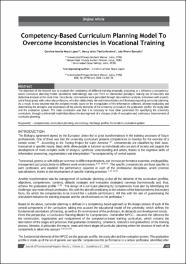| dc.description.abstract | “The objective of the research was to evaluate the consistency of different training proposals, proposing as a reference a competency-based curriculum planning model. Qualitative methodology was used from an interpretive paradigm, making use of inductive and deductive analysis at the same time. Inductively, observations were generated through documentary analysis, interviews with experts, and a focus group with university professors, who then deductively derived interpretations and forecasts regarding curricular planning. As a result, it was obtained that the designed model, based on the triangulation of the information collected, allowed evaluating and determining the strengths and weaknesses of the priority elements of the university curriculum: the graduation profile, the study plan and the evaluation system. The main conclusion was that it is necessary to have clear parameters for specifying the university curriculum, through a referential model that allows the development of a virtuous circle of evaluation and continuous improvement of curricular planning.Keywords: -competencies; curriculum planning; consistency; discharge profile; Curriculum; evaluation systemINTRODUCTIONThe Bologna agreement signed by the European Union led to great transformations in the training processes of future professionals. One of these was that the university curriculum presents competencies to develop for the exercise of a certain career 18 . According to the Tuning Project for Latin America 45 , competencies are classified by their basic, transversal or specific nature. Basic skills allow people to function as individuals who are part of society and support the development of more complex skillsof analysis, synthesis, understanding and action, thanks to the cognitive skills of information processing, argumentation and interpretation 44 accompanied by of central aspects.Transversal, generic or soft skills are common to different professions, and increase performance expertise, employability, management and productivity in different work environments 8,14, 19,26,44 . The specific competencies are those specific to each profession, and establish the performance expected in each of the professional disciplines, which promote specialization, thanks to the development of specific training processes 2, 20, 39,44 .Another transformation was the management of curricular planningso that all the elements of the curriculum (profiles, objectives, competencies, contents, didactic strategies and evaluation strategies) converge harmoniously and, thus, achieve the graduation profile 11,38 . The design of a curricular planning by competencies must start by identifying the challenges and needs of each profession, this with the aim of contributing to the solution of the latent problems that society faces, for which the competencies to be trained for a suitable performance. All this with theaim of guaranteeing the articulation between the training proposal and the set of demands on the profession 6 .Based on the above, curricular planning is defined in a competency-based approach as the design process of each of the central components of the curriculum, taking into account the educational model of the university, which defines the fundamental orientations of training, as well as the environment of the profession, its demands and development trends.From this perspective, a Curriculum Planning Model for Competencies -hereinafter MPCC -becomes the reference for the construction, organization and readjustment of the competency-based training curriculum, which contains the description of the stages and processes that guarantee consistency, coherence, relevance and gradualness of the training process, likewise, it articulates the macro, meso and micro stages of curricular planning where the structure of each of its components is taken into account 3,24,25,41,50 .The fundamental elements of the MPCC are the graduate profile, the study plan and the evaluation system. The graduation profile is made up of the set of generic and specific competencies for performance in a certain profession, identified after
“ | es_ES |


